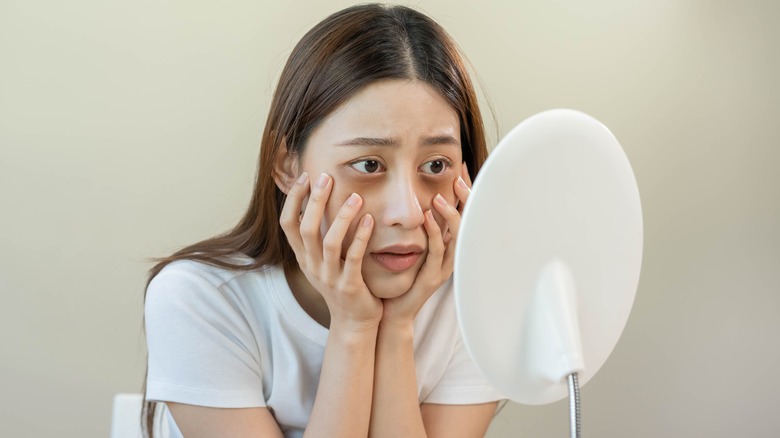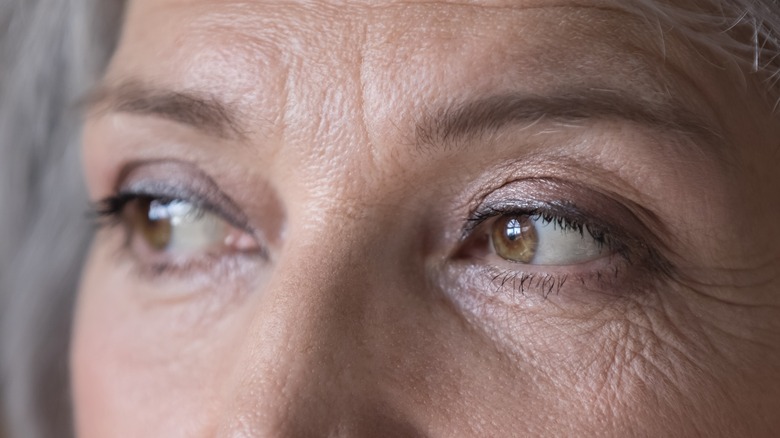What Causes Bags Under Your Eyes?
If you've experienced puffy, saggy bags or dark circles under your eyes, you're not alone. Experts say that anyone at any age can develop these unwanted eye bags (via The Healthy). Perhaps what's more distressing is that, according to those in the know, there is no way to completely get rid of these bags once you develop them, outside of surgery.
Although eye bags can be unsightly, according to Johns Hopkins Medicine, they're unlikely to impact your vision or result in any health consequences. There are some cases in which baggy eyes can be a sign of an underlying condition, such as dermatitis, thyroid eye disease, and renal problems (via the Mayo Clinic). However, more often than not, the causes of eye bags can be traced to more common maladies, such as aging, lack of sleep, smoking, or allergies. Unfortunately, your genes can also be a culprit, as eye bags tend to run in families.
Aging can be unkind to your eyes
As we age, we lose skin tone, causing the tissues around the eye to grow weak (via the American Academy of Ophthalmology). As these eye tissues weaken, fat can slide forward into the lower eyelids, creating the swollen look commonly associated with puffy eye bags. In addition, fluid can also collect under the eyes, causing swelling. According to the Cleveland Clinic, age-related loosening of the skin can cause the blood vessels under your eyes to become more visible, leading to the appearance of dark circles.
Aging is not the only factor in your eyes looking puffy. According to Johns Hopkins Medicine, puffy eyes can be caused by eating a high-salt diet, which leads to water retention, or allergies, which can create inflammation under the eyes. Genetics are a big culprit as well, according to plastic surgeon Dr. Brett Kotlus. Chances are if family members such as parents or siblings have eye bags, you most likely will as well.
It is important to note that some medical conditions can make these under-eye bags worse (via Natural Eye Care). These include thyroid problems, kidney issues, and an adrenal deficiency brought on by factors, such as stress, lack of exercise, poor diet, or medications that can affect sleep patterns.
Treatment can start at home
Treatments for eye bags include at-home remedies, such as cold compresses, tea bags on the eyes, and chilled cucumber slices placed over the eyes (via Johns Hopkins Medicine). Additionally, over-the-counter hemorrhoid creams can be used as a remedy for eye bags, as they contain phenylephrine, which can narrow blood vessels and bring swelling down. However, great caution should be applied when using this treatment, as these creams can cause irritation.
In addition, you can try to get enough sleep, and sleep with your head raised slightly to keep fluid from pooling beneath your eyes at night (via the American Academy of Ophthalmology). In more severe cases, a surgical procedure called blepharoplasty may be necessary. In a blepharoplasty, a surgeon will reposition the fat under the eyes and, if necessary, remove excess skin. However, according to the Mayo Clinic, there are risks associated with this procedure, including eyelid problems, skin discoloration, and temporary blurring of vision. Before taking any measures to manage eye bags, discuss your condition with your doctor or ophthalmologist to determine what's best for you and your eyes.



